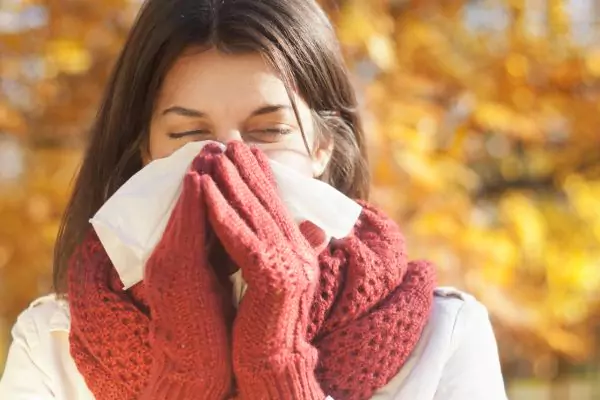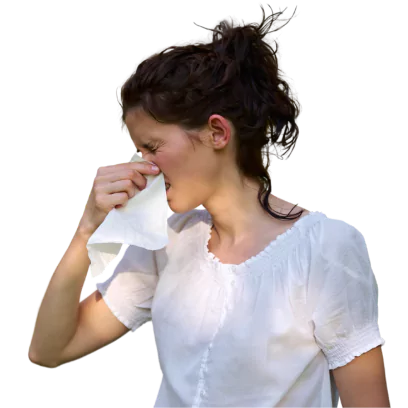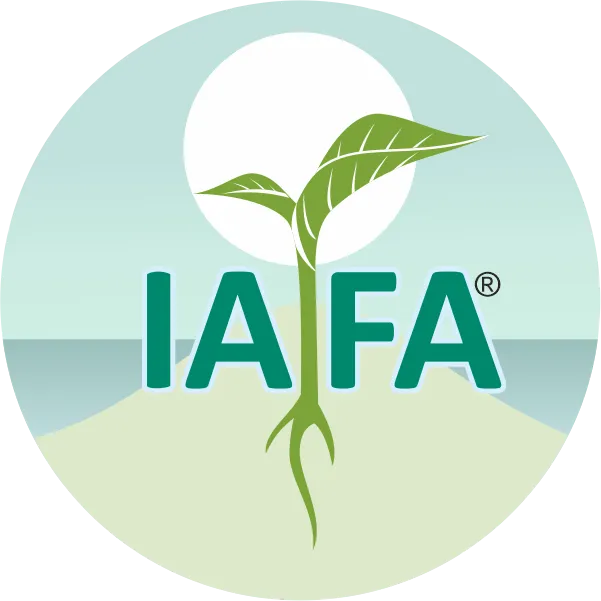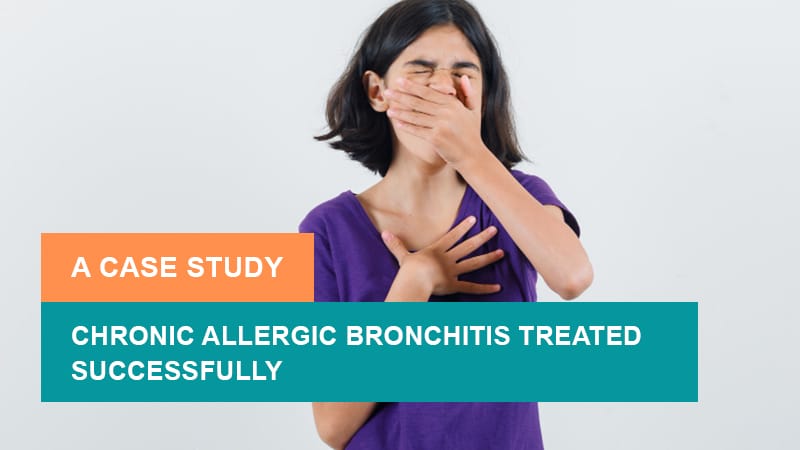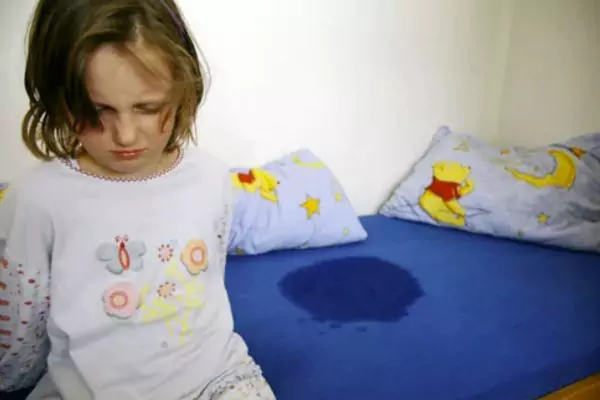On This Page
Seasonal Allergy – Causes, Symptoms and Ayurvedic Treatment
क्रुद्धावातोल्बणादोषानासायांस्त्यानतांगता: l
जनयतिप्रतिश्यायंवर्धमानंक्षयप्रदम् ll
Seasonal allergy is the type of allergy that happens during different times of the year. It is also called ‘Hay Fever’ or ‘Seasonal Allergic Rhinitis’. It is caused mainly due to the spread of pollen grains from different plants, spores of molds, etc. through the air. It can start at any age but usually occurs during childhood. According to Ayurveda, during each Ritu (season) there will be natural vitiation of doshas causing corresponding symptoms. Most of the symptoms of seasonal Allergy are similar to that of Pratishyaya. Ayurveda has mentioned various successful internal as well external treatment measures for “Seasonal Allergy”.
Causes of Seasonal Allergy
When molds or pollens enter the body, the immune system produces chemicals like histamines that fight against them. These chemicals result in various allergic reactions in the body. Reasons for allergies differ in different seasons. During springtime, pollen from many trees; during summer grasses and weeds; during autumn, pollen from small plants; during winter, indoor allergens like mold, dust mites, etc. are the major causes for allergy. Smoke, insect bites, the smell of flowers, etc. are some of the triggering factors of allergy.
Ayurveda explains that snow, wind, dust, water, etc. are some of the reasons for Pratishyaya. These factors are extremely affected by seasonal changes and so can be connected to seasonal allergies.
Symptoms of Seasonal Allergy
Symptoms are mainly those affecting the respiratory system. It includes:
- Sneezing
- Post nasal drip
- Itchy eyes, nose, and throat
- Redness of eyes
- Watering of eyes
Ayurveda suggests different dosha prakopa (aggravation of factors named Vata, Pitta, and Kapha) in different seasons. Varsha (rainy) is the season of aggravation of Vata dosha and results in symptoms like dry cough, restlessness, dry eyes, headache, sneezing, etc. Pitta dosha is aggravated during Saradrtu (autumn). It causes symptoms like redness and burning of eyes, rashes, headache, etc. During Vasantakala (spring) Kapha dosha aggravation occurs and results in symptoms like runny nose, nasal congestion, heaviness, watery eyes, etc.
Ayurvedic Reference of Pratishyaya (Seasonal allergy)
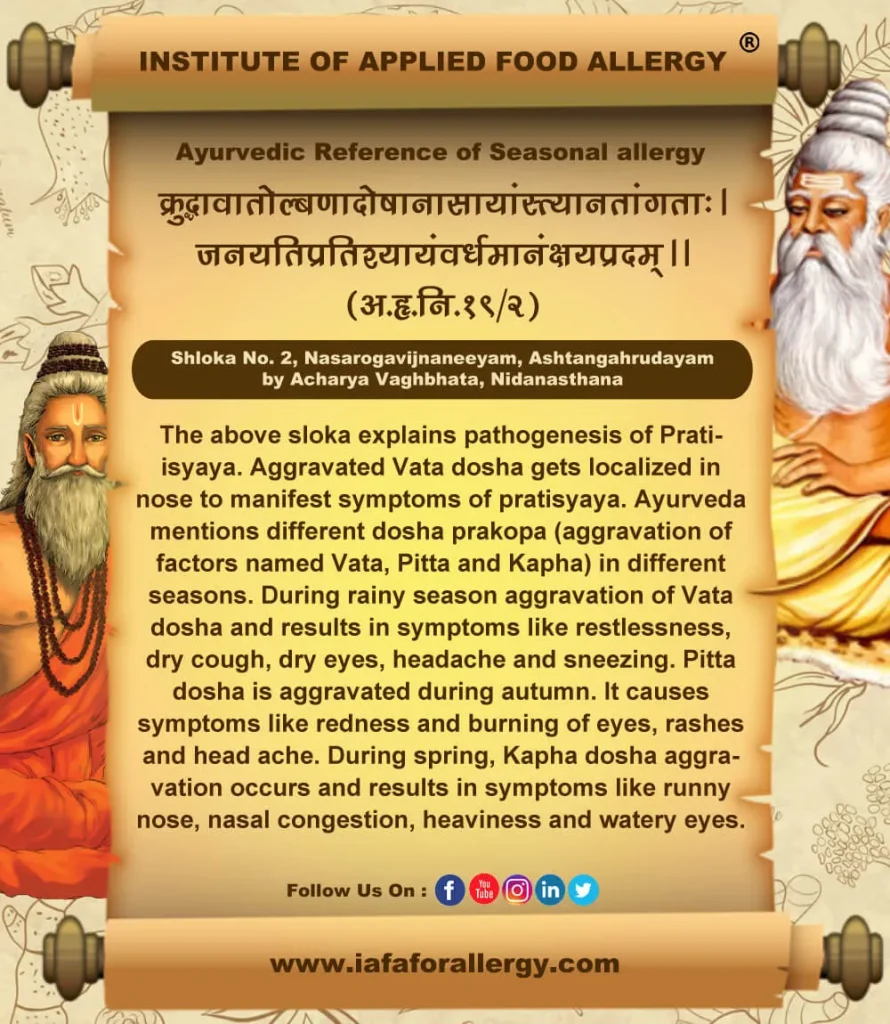

“Institute of Applied Food Allergy® is the perfect destination for treating “Seasonal allergies” as well as any type of allergies. The unique internal and external treatment measures, if followed properly will assure complete cure in various allergic conditions including “Hay Fever” or “Seasonal allergic rhinitis”.
Visit us today and say goodbye to your allergy!!!
– Dr. Sahil Gupta (B.A.M.S., M.H.A.)
Ayurvedic Allergy Specialist
CEO & Founder of IAFA®
At last, Easier Seasonal Allergy Management

Trusted by
More than 90,000 Patients

Convenient
at-Home Treatments

9.2 / 10
Customer Satisfaction Score
Ayurvedic Treatment of Seasonal Allergy
Ayurveda has specific treatment for allergic manifestations. The combination of internal medicines and various treatment procedures are very effective in the management of allergies.
Internal Medicines for Seasonal Allergy
- Trikatu Churna
- Vyoshadi Vatakam
- Talisapatradi Churna
- Dasamoola Kwatha
- Amrutothara Kwatha
- Elakanadi Kwatha
- Indukantha Kwatha
Treatment Procedures for Seasonal Allergy
Purification therapies as well as other procedures are beneficial in treating seasonal allergies. Following treatment, modalities can be adopted based on the dosha aggravation and patient condition.
- Vamana (Emesis)
- Snehapana (Intake of medicated ghee or oil)
- Swedana (Steaming)
- Dhumapana (Intake of medicated smoke)
- Gandusha (Holding of medicated liquids in mouth)
Single Herbs in Seasonal Allergy
Following single drugs can be taken in suitable forms and with proper adjuvant:-
- Shunti (Zingiber officinale)
- Pippali (Piper longum)
- Amalaki (Emblica officinalis)
- Nimba (Azadirachta indica)
- Tulsi (Ocimum sanctum)
- Haridra (Curcuma longa)
Diet Management in Seasonal Allergy
Pathya (Do’s)
The practice of following things can greatly help in the prevention and avoidance of recurrence of seasonal allergy:-
- Intake of light, warm food
- Food should be of sour taste with salt added.
- Use of barley, wheat, pomegranate, etc.
- Use of warm water for internal and external purposes
- Wearing heavy clothes like a sweater in the cold season
- Covering head and throat during the winter season
- Maintain Hygiene
Apathya (Don’ts)
Avoid the following things to prevent aggravation of symptoms:-
- Cold and refrigerated food
- Heavy and fatty food
- Use of cold water for internal and external purposes
- Excess bathing time
- Day sleep
- Emotions like anger, sorrow
Yoga and Pranayama for Seasonal Allergy
Yoga provides physical as well as mental fitness. Various asanas (postures) are beneficial to increase the body’s immunity. Suryanamskara, savasana, Sarvangasana, svanasana, etc. help in the relaxation of the mind and rejuvenate body tissues. Pranayama is the method of controlling the breath. It helps to normalize vitiated doshas and to clear body channels. It is a process by which benefits of mental as well as physical detoxification can be achieved.

Frequently Asked Questions
Question: What is Seasonal Allergy?
Answer: Seasonal allergy is the hypersensitivity reaction of the body’s immune system towards allergens that appear during different seasons.
Question: What are the Symptoms of Seasonal Allergy?
Answer: The symptoms may vary according to the season of exposure. But major symptoms are those affecting the respiratory system like sneezing, postnasal drip, headache, wheezing, etc.
Question: How Ayurveda helps in the Cure of Seasonal Allergy?
Answer: Ayurveda is very effective in the management of seasonal allergies. Internal medicines, purification therapy, and other procedures help to normalize the balance of doshas in the body and thereby to get relieved from seasonal allergy.
Question: What is the cause of Seasonal Allergy?
Answer: According to Ayurveda, when the aggravated doshas get localized in the nose, it manifests the symptoms of pratishyaya (allergy).
Question: How to avoid recurrence of seasonal allergy?
Answer: The simple practices such as intake of light and warm food, hot, sour and spicy soup, use of barley, wheat, pomegranate, covering head and throat during winter season etc. and avoidance of cold and refrigerated food, heavy and fatty food, intake of excess quantity of water, day sleep, emotions like anger, sorrow, grief etc. can help in avoiding recurrence of seasonal allergy.
Question: How Ayurveda is helpful in treating seasonal allergy?
Answer: Ayurvedic treatment under the expert guidance is quite effective in the treatment of seasonal allergy. It is safe and free from side effects. Ayurveda has specific treatment for allergic manifestations. It includes the combination of internal medication and external procedures according to the condition of patient.
Question: What are the herbs useful in seasonal allergy?
Answer: Various herbs such as Shunthi (Zingiber officinale), Pippali (Piper longum), Amalaki (Emblica officinalis), Nimba (Azadirachta indica), Tulsi (Ocimum sanctum), Haridra (Curcuma longa) etc. are very effective.
Question: What is the role of Yoga and Pranayam in the treatment of Seasonal Allergy?
Answer: Yoga and Pranayam provide physical and mental fitness. These are beneficial in increasing body’s immunity, controlling breath, normalizing the vitiated doshas, clearing body channels etc.
References
- Shloka No. 2, Nasarogavijnaneeyam, Ashtangahrudayam by Acharaya Vaghbhata, Nidanasthana.
- Agnivesha. Charak Samhita, Commentary by Chakrapani Varanasi, Chaukhamba Sanskrit Sansthan; reprint: 2004, Ch. Chi 8/49 -50.
- Sushruta Samhita, the Nibandha Sangraha commentary by Dalhanacharya and the Nyayachandrika Panjika of Sri. Gayadasacharya on Nidana Sthana, edited by Vaidya Jadavji Trikamji Acharaya and Narayanarama Acharya, Kavyatirtha, Chaukhamba Surabharati, Varanasi; reprint 2003. Su. Ut. 24/16 – 17.
- Ayurvedic Aspects of Allergies and Fungal Infections, Edition 2021, by Sahil Gupta, Seasonal Allergy Chapter No. 8, Page No. 50-54.
Dr. Gupta’s IAFA is the leading institution in the management of various immune related disorders. IAFA is the most reliable institution that provides ultimate Ayurvedic treatment for your illness.
IAFA holds your hand to wellness!!
Was this Page Helpful?
So IAFA Ayurvedic Management of Seasonal Allergy is just 3 steps away!

01. Connect With Us
Share your history of illness or Book your appointment

02. Consult With Us
Dr. Gupta a certified Ayurvedic Allergist Consultant

03. Root Cause Treatment
Get an accurate diagnosis, medicines, diet & lifestyle change
Seasonal Allergy – Case Studies
Real Case Studies of Successfully Treated Patients from All Around the World by IAFA Ayurveda®

9 Year Old Female Patient Recovered from Chronic Allergic Bronchitis – A Case Study
This case study presents a 9-year-old female patient who has successfully recovered…

12-Year-Old Child Recovered from Sun Allergy and Polymorphous Light Eruption (PMLE) – A Case Study
This is a case study of a 12-year-old child who has successfully…

40-Year-Old Female Patient Recovered from Dyshidrotic Eczema and Onychomycosis – A Case Study
This case study highlights the successful recovery of a 40-year-old female patient…

40-Year-Old Female Patient Recovered from Urticaria and Angioedema – A Case Study
This case study focuses on a 40-year-old female patient who has successfully…
Read More Articles

Bed Wetting (Shayyamutra)
Bedwetting is an embarrassing habit in some children where they are unable…

Attention Deficit Hyperactivity Disorder – ADHD (Vatika Unmada)
Contact IAFA Ayurveda® to get safe and natural remedies for the treatment…

